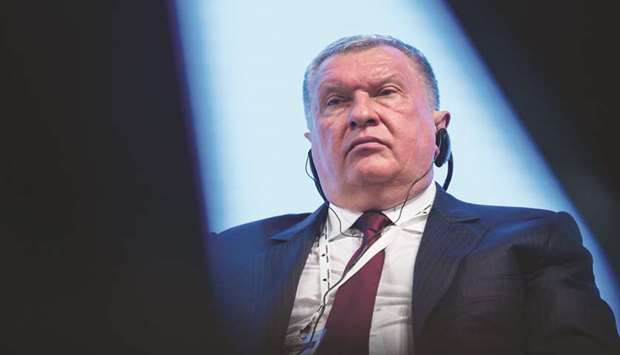Tighter US sanctions on Iran’s oil exports won’t trigger supply shortages in the coming months because other suppliers will step up to fill the gap, said the head of Russia’s largest crude producer.
When asked last week whether Russia should gradually end output cuts and increase its oil production in response to the end of sanctions waivers for Iran’s customers, Rosneft PJSC chief executive officer Igor Sechin referred the matter to the Energy Ministry. Yet he also noted that US Secretary of State Mike Pompeo said US policy depends on two of Moscow’s allies in the Opec+ coalition rolling back some of their own supply reductions.
“I would like to draw your attention to Pompeo’s statement that even if Iran’s exports fall to zero, they will be compensated by Saudi Arabia and the United Arab Emirates,” Sechin told reporters in Beijing on Friday. This question “should be addressed to our Energy Ministry as it co-ordinates” joint work with other members of the Opec+ countries, he said.
Rosneft’s boss has on several occasions expressed concern that output co-operation between the Organisation of Petroleum Exporting Countries and its allies has only short-term effects on supply and could result in Russia losing its global market share. While Rosneft has complied with its quota for curbing output as part of the deal, the company was quick to ramp up production when the cuts were relaxed last June.
The US said last week that it would not extend waivers for buyers of Iranian crude, which allowed them to continue purchasing cargoes despite American sanctions, after they expire on May 2. China, India, Japan, South Korea, Italy, Greece, Turkey and Taiwan now face the prospect of having to find alternative supplies.
Pompeo added that Saudi Arabia, the UAE and US producers will ensure “appropriate supply” to the global market when the waivers expire this week. “Each of those suppliers is working directly with Iran’s former customers,” he said.
Russia’s Urals crude is similar in quality to Iranian blends. So refineries which are geared to process Iranian crude can technically switch to volumes from Russia.
Saudi Arabia said earlier last week it sees no need to rapidly increase crude production.
Nigeria’s Minister of State for Petroleum Resources Emmanuel Kachikwualso said he is supportive of a six-month extension to the Opec+ production cuts deal when it expires in June.

Igor Sechin, chief executive officer of Rosneft, attends a panel session at the XI Eurasian Economic Forum in Verona, Italy, on October 25, 2018. Rosneft’s boss has on several occasions expressed concern that output co-operation between the Organisation of Petroleum Exporting Countries and its allies has only short-term effects on supply and could result in Russia losing its global market share.
